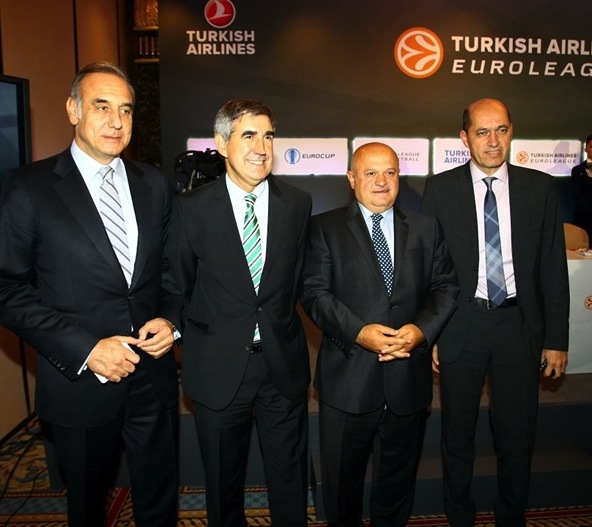
The opening salvos have been fired with little dignity. It’s not going to get prettier. Everyone needs to grow up. That’s what Emmet Ryan thinks of the latest FIBA vs ULEB spat.
Didn’t we already go through this around the turn of the century? ULEB and FIBA Europe fought for control of Europe’s top competition and there was a clear and resounding winner. Panathinaikos, CSKA Moscow, and Maccabi Tel Aviv all stayed with FIBA’s Suproleague initially but after a season everyone rowed in with ULEB. The split lasted a season, the winner was clear.
From there what we know as Euroleague and Eurocup have blossomed, evolving into their current forms with more games than ever between the elites of Europe. FIBA retains control of Eurochallenge, a third tier competition which struggles from its lack of direct ties to the two superior competitions. Now FIBA wants to change all that by taking command from the top.
What we really don’t need in European hoops right now is another war. Euroleague’s admission/qualification structure is finally sorting itself into something reasonable. Eurocup has benefitted in the trickle down sense as that competition’s benefits from the boost of clubs that exit after Euroleague’s regular season. Eurochallenge, well it remains on an island.
FIBA’s approach so far has been to declare, at the bottom of press releases, what they are doing and assume everyone will row in. If you changed that B to a second F they might have a point but FIBA’s control of the sport is not on the same planet as it’s equivalent in soccer. If FIBA wants a war, it can be sure Euroleague will come with superior firepower than it had 15 years ago. It’s hard to see Maccabi, Panathinaikos, and especially CSKA jumping ship after the changes that have been made to Europe’s top club competition in recent years.
The Adriatic League clubs have also been essentially alienated by FIBA’s announcement, again at the end of a press release, by the governing body saying it won’t approve the league after this season. Crvena Zvezda, Partizan, Cibona, Cedevita, and the rest aren’t exactly chomping at the bit to return to conventional national leagues. The VTB League clubs must also be looking on at what is happening with the ABA Liga and thinking “nope, we like to run our own show”.
To really get to the heart of this current dispute we have to go all the way back to FIBA’s plans to restructure the sport at an international level. The adjustment in calendar makes a great deal of sense in terms of marketing the sport. International basketball attracts a lot of eyeballs, particularly compared to the club game, but it’s only really on the radar for most fans for two to three weeks of the year. FIBA, as the body that controls that part of the market, naturally wants to get a whole lot more out of its asset.
FIBA’s approach was to essentially declare that it would start organising qualifiers along the same lines as UEFA/FIFA, mid-season with scheduled breaks from club action to free up players. This was met with a collective “whut?” from the NBA regarding Team USA. The reaction from Euroleague and clubs around Europe was more of a loud “Ahem, do you mind?”
Technically speaking, Euroleague/ULEB and FIBA have been cooperating since 2005. The past few months have shown these are two organisations who aren’t even frenemies. Any moves forward in European basketball have to be collaborative.
If we see a repeat of the 2000/01 season, where two champions of Europe were crowned, we won’t be laughed at by observers across the Atlantic. We will be ignored.
For all of Euroleague’s strength in this fight, and it holds a powerful hand, the value of the international game as a marketing tool can’t be ignored. Mid-season breaks may not be ideal in terms of the calendar but if gaining eyeballs during the year for the sport on this continent is an upside, it’s at least worth trying to find a way to make it work.
Right now FIBA is making a power play. It wants to have a big say in whatever the final shake-up is by acting right now like it has the only say. That may be an aggressive stance but it’s not going to win any friends by burying the lede in press releases and acting unilaterally.
Turgay Demirel and Jordi Bertomeu are proud men with big roles. Neither wants to yield and right now the former’s body is the one taking all the action. Bertomeu is playing this out patiently, at least in public. Rest assured the brain trust in Barcelona has counter measures planned. We are months, if not weeks, away from civil war.
There is no way, absolutely none, that such a conflict benefits European basketball. A power struggle will only weaken the overall product even if one body wins out clearly. Whatever FIBA or Euroleague feel should happen, whatever these bodies believe is right, they have to find a common ground. There needs to be respect for each position and real cooperation.
In short, stop shouting and start talking.




Leave a Reply